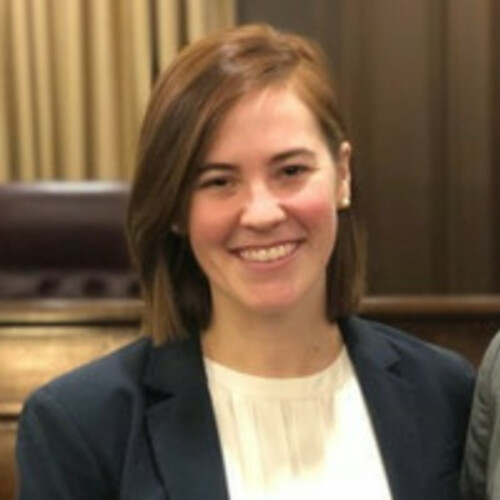Careers
Study Russian. Do Anything.
What can I do with a Russian major?
Making Russian a centerpiece of their undergraduate education--often in conjunction with majors in Political Science, History, and Economics--has prepared our students for a variety of challenging and rewarding careers. Our graduates have used the skills they developed with us to enter the most prestigious graduate and professional schools in the US, take positions in leading companies in the business world, and find employment in the Russian Federation as well as in several Russian-speaking countries of the former Soviet Union
Skills you'll learn
- Effective written and oral communication
- Critical thinking and analytical reasoning
- Ethical judgment and decision making
- Ability to articulate complex thoughts and theories
- Ability to analyze problems from multiple perspectives and articulate creative solutions
- Strong intercultural competence
- Strong research skills
- Working effectively both independently and in a group
- Ability to solve problems with people from different backgrounds
- Ability to think flexibly and with empathy in new contexts
- Ability to interpret and communicate complex data to various stakeholders

Casey Connolly ’14
Attorney, U.S. Navy JAG Corps
"I used my knowledge of Russian to do spot translations in white-collar criminal cases while working as a litigation paralegal. My experiences studying Russian formed the basis of my law school application personal statement. While in law school at Harvard, I continued to take Russian graduate courses on the side. When I ultimately applied to the Navy JAG Corps, Russian was a point of interest on my application that was cited by my interviewers -- since it is considered a critical language, it is valued by the military/national security community."
-
Casey Connolly ’14
Attorney, U.S. Navy JAG Corps
"I used my knowledge of Russian to do spot translations in white-collar criminal cases while working as a litigation paralegal. My experiences studying Russian formed the basis of my law school application personal statement. While in law school at Harvard, I continued to take Russian graduate courses on the side. When I ultimately applied to the Navy JAG Corps, Russian was a point of interest on my application that was cited by my interviewers -- since it is considered a critical language, it is valued by the military/national security community."
-
Bill Champness ’07
Financial Advisor, Morgan Stanley, New York
"While what I studied doesn't directly relate to what I do now, the skills I learned from studying Russian have helped me immensely. I think the challenging subject matter and small class sizes created a sense of personal accountability to make sure that I was getting my work done on time and really understanding the material knowing I'd likely get called on to demonstrate what I've learned. I was lucky enough to be able to study abroad in Moscow. While I was there, I learned to interact with a new culture in a different language, problem solve, be flexible, and adapt in ways that are hard to simulate elsewhere."
-
Peter Stankiewicz ’17
Lower Secondary Science Teacher, Bishkek, Kyrgyzstan
"Even though I decided to pursue a degree in biochemistry, almost my whole career up until this point has been founded on my Russian degree. My study of Russian history and literature inspired me to continue pursuing Russian language and culture through first hand experience. I received a Fulbright to teach in Russia and then became a Peace Corps volunteer in the Kyrgyz Republic, both of which have been immense maturing experiences for me and will be a great way to spring into further study, be it Russian or not."
-
Brittnee Carter ’08
Assistant Professor, Political Science, University of Kansas
"After ND, I went to U of Washington for a Master's in Russian East European, and Central Asian studies. The work I did in that program provided me several government contracts related to the region and made me a competitive candidate for a Ph.D. program. In addition to being an assistant professor, I am an executive committee member and affiliate faculty of the Center for Russian and East European Studies at the University of Kansas."
-
Vanessa Milano ’09
Clinical fellow in Stereotactic and Functional Neurosurgery, Toronto Western Hospital
" I like to theorize that my study of languages helped me quickly synthesize medical terminology and pattern recognition in medical school. As a doctor, I have taken care of a small number of Russian-only speaking patients and even performed awake brain surgery on one - being able to speak to them directly (without a translator) helps make the doctor-patient connection. As an undergraduate, I studied abroad in St. Petersburg during a summer - I consider it one of the formative experiences of my young adulthood."
95% of recent Notre Dame Russian majors found full-time employment, enrolled in graduate school, entered service programs, or joined the military within six months of graduation.
Note: Outcomes data comes from First Destination reports, a survey of recent graduates conducted by the Notre Dame Center for Career Development and Office of Strategic Planning and Institutional Research. Status is known for more than 90% of each graduating class.
Further Reading
The Face of Russia: PBS interactive timeline of Russian history and culture from 850 A.D. to the present day, including hundreds of images, movies and audio tracks.